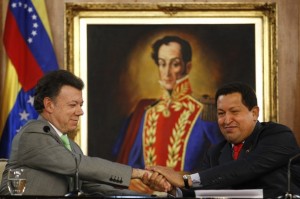State of Affairs: The Nascent Colombian-Venezuelan Relations
It’s undeniable that one year after Juan Manuel Santos was sworn in as president of Colombia, the nation’s policies regarding relations with Venezuela have pulled a 180 degree turn. In a sign of the increasingly friendly discourse, Santos went so far as to call Chávez his “newest best friend.” This dramatic change is in direct contrast to the policy of former President Álvaro Uribe, who called for the economic containment of his Venezuelan neighbors. While many voters still feel betrayed by Santos, who promised to continue Uribe’s stance toward the Bolivarian Republic, both nations have been able to work past lingering feelings of discontent to develop a constructive relationship.
Rising above diplomatic hostilities, both nations have effectively engaged in multilateral cooperation through repairing their relationship within the Union of South American States (UNASUR). In the past Chavez and Uribe chided over a Colombian plan to allow U.S. Military bases on Colombian soil, but today both countries are working together to co-head this supranational organization alongside its brand new secretary general Maria Emma Mejia.
Furthering trans-national collaboration, the Chávez administration began paying off a $600 million debt to Colombia as of August 2010. On the same day, Bogotá and Caracas agreed to open new treaties regarding cooperation in health care, transportation, infrastructure, security and development along the border. In a reciprocal display of openness to both left-leaning countries and traditional allies like the United States, President Santos recentlyheld a meeting with Peruvian President-elect Ollanta Humala to discuss a future economic trade agreement, as well as other bilateral projects. While Chávez was expected to attend the meeting in Bogotá, health complications did not permit him to travel.
Even in the midst of a relatively calm relationship between Colombia and Venezuela, Uribe-Chávez confrontations remain prominent along both sides of the border as Colombia begins to expand its reach to other markets. Many in the Colombian business community—specifically, those involved in the automotive and banking industries—switched their focus from Venezuela to other areas in Latin America in the wake of Chávez’s draconian measures against private enterprise. Instead of allowing Petróleos de Venezuela (PDVSA), the largest state oil company in Latin America to dominate the Colombian oil industry, the Brazilian Petrobras—another regional juggernaut—was commissioned to explore potential oil reserves along the coastal and llanos regions of Colombia.
More recently, the integration of the Bogotá stock exchange with those of Lima and Santiago proves that Colombia has explored greener pastures for conducting business. In response to certain economic restraints that Venezuela has imposed upon Colombian goods and services—chief among them the expropriation of Colombian retailer store Exito— the Colombian government set up a plan to seek membership in exclusive economic unions, such as the Asia-Pacific Economic Cooperation and the Organization of Economic Cooperation and Development. Additionally, Colombia signed the “Pacific Agreement,” a new economic trade accord that includes Mexico, Peru, and Chile with whose goal of facilitating the flow of goods, services, people and assets among these four nations.
Regardless of Colombia’s expanding economic integration with other nations, there are signs that Santos and Chavez have overcome significant points of past diplomatic contention. Recently, Santos avoided a bout of bilateral animosity, even after the developments of last May, in which the International Institute for Strategic Studies publically released a 240-page report claiming that the Revolutionary Armed Forces of Colombia (FARC) received financial support and shelter in Venezuela. During the Uribe administration, Chavez’s alleged connection with leftist guerillas completely spoiled diplomatic trust between these two countries. Yet, in a complete break with the past, Santos has largely ignored this issue in the interest of building a productive rapport with his neighbor.
Despite how maturely both governments have handled the bilateral discord of the Uribe era, the Chávez administration must truly galvanize its relations with Colombia by taking a stronger stance against FARC and drug traffickers. As is always the case, there will be areas of disagreement between the two countries. However, effective diplomacy and a strong will to solve differences across the board must prevail in order to seek unity and security among the nations.
This piece was written by COHA Research Fellow Robert Valencia of the bilingual blog My Humble Opinion/Mi Humilde Opinion


